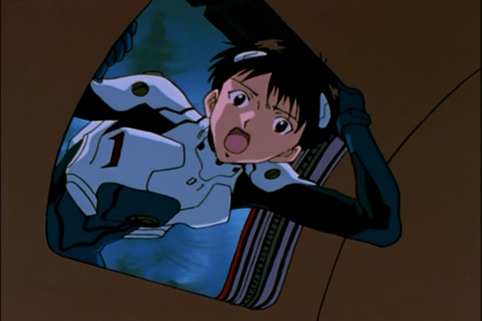The Peculiar Olympians: Shinji Ikari

“The Peculiar Olympians” is a series of blog posts about my most favourite fictional characters. They are each here for some combination of sympathy, empathy, inspiration, humour, quality, staying power, and/or significance to my relationship with fandom. These are not all the characters that I like, but they are the ones that have stood out to me the most. The list is also alphabetical and nothing more.
Though I never rank my favourite things, for a while I considered making Shinji at least the number one character on the list, because his appeal was so different from that of the other characters’, though not entirely foreign, either.
In the year 2015, Earth was devastated by a global catastrophe known as Second Impact. Life has resumed a semblance of normalcy after the 2000 incident, but now the Angels have reappeared: strange creatures with bizarre and multifarious shapes, who cannot be successfully combated by ordinary human forces. Fourteen-year-old Shinji Ikari is summoned by his distant father, Gendo, to be the pilot of Evangelion-01, one of a series of humanoid fighting machines designed to combat the Angels. As each Angel comes, Shinji and other characters must deal with the pain of their own psyches in addition to the stresses of combat, while some try to understand exactly what circumstances created the world they find themselves in now.
Shinji Ikari has been a favourite of mine for a long time, and I’ve grown to find the widespread nerd hatred of Shinji to be stupid and overblown, instead of staying offended by it. Strangely enough, this came right on the heels of my urge actively ensure that my own writing contains stronger and active characters. Writers may not have to write just what they feel like doing, but diligently watch their characters’ movements to make sure the potential audience remains interested. It’s a sobering lesson to learn.
However, this is what makes Shinji so interesting-he manages to be compelling in spite of breaking the rule that a character in popular fiction, no matter their personality, must always be ready to act. In allowing his angst to sometimes paralyze him or fuel bad judgements, Shinji is sometimes misread as exaggerated and theatrical, when the opposite is true. His is a portrayal that shows exactly what happens to people in the depths of despair; such realism is often avoided because it doesn’t make for good storytelling, but there are always exceptions. There is a strange beauty to the raw portrayal of a mind trapped in its own pain, an aspect to life that popular fiction usually avoids.
Shinji is not entirely detached from the streamlining effect of fiction, however, which is fine with me. There is still a plot, after all, and there are times when Shinji proves himself able to take action for moral reasons, and to be humorous or endearing. He’s a character with multiple facets. There are times when he also takes highly immoral actions, including one that should have put him off my radar for good, yet it didn’t. In the end, Shinji does choose what may be right, although the series leaves viewers to decide if the abstract principle was as fulfilling as the actual outcome.
All of my interest in Shinji Ikari is for more than the sake of clinical dissection, however: I do have a genuine liking for the character. I enjoy the way he’s written, and I also find Shinji to be likable and good-natured when not under pressure. That doesn’t excuse him from any moral condemnation viewers care to make, of course, but it goes some way to being a fan of Shinji instead of a detached observer.
I have found that only Shinji in the original TV series, and the film End of Evangelion, to have that appeal. In the manga, and so far in the series of Evangelion remake movies, Shinji’s portrayal is toned down. He can be slightly more aggressive, and his scenes of surreal introspection may be glossed over. As a result, his character is made bland, if not entirely standardized.
(However, I do believe the original Shinji would have reached into the void to rescue Rei Ayanami as he did in the second Rebuild film, because Shinji is not entirely passive, and cares about other people. That’s why Shinji came back in the original episode 19, which the movie scene roughly aligns with.)
Nor do the characters that inspired Shinji, or that Shinji was inspired by, possess that same compelling quality. I did like Tsukasa from .hack a bit, but even had I not had problems with the series, he wouldn’t have been as striking as Shinji. Nor do I find any similar character alleged to be an improvement on Shinji to be an actual improvement-it’s always silly to think a character can be “improved” on by another different one.
I also don’t ship Shinji with anyone. Any fan pairing rising out of Evangelion seems inevitably dysfunctional, and there’s no fun in speculating about those. Asuka and Shinji hate each other as much as they love each other, and not in a cutesy way. Kaworu and Shinji had no substance, which was the point-Kaworu represents the ideal world that Shinji cannot have, and so he must be killed. And so on and so forth.
Overall, while I know very few can get a character like Shinji right, it’s this very feeling of rightness that draws me to the character. He is written how writers are discouraged to write characters, yet I find him compelling in a way that no other character quite is. It’s not the point that Shinji is realistic, for characters in popular fiction don’t have to be, but that he is fascinating.